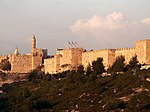Jerusalem–Central railway station
Pages with no open date in Infobox stationProposed railway stations in IsraelRailway stations in JerusalemRailway stations located underground
Jerusalem–Central railway station (Hebrew: תחנת הרכבת ירושלים – מרכז, Tahanat HaRakevet Yerushalayim–Merkaz; Arabic: محطة أورشليم – مركز) is a proposed railway station in Jerusalem.
Excerpt from the Wikipedia article Jerusalem–Central railway station (License: CC BY-SA 3.0, Authors).Jerusalem–Central railway station
Jaffa, Jerusalem Nahlaot
Geographical coordinates (GPS) Address Nearby Places Show on map
Geographical coordinates (GPS)
| Latitude | Longitude |
|---|---|
| N 31.7838 ° | E 35.2166 ° |
Address
יפו
Jaffa
9422904 Jerusalem, Nahlaot
Jerusalem District, Israel
Open on Google Maps








